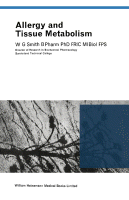Browse content
Table of contents
Actions for selected chapters
- Full text access
- Book chapterAbstract only
Chapter I - The immunological basis of allergic disease
Pages 1-14 - Book chapterAbstract only
Chapter II - Anaphylactic shock in experimental animals
Pages 15-32 - Book chapterAbstract only
Chapter III - The connective tissue mast cells and blood eosinophils
Pages 33-48 - Book chapterAbstract only
Chapter IV - Histamine
Pages 49-58 - Book chapterAbstract only
Chapter V - The slow reacting substance of anaphylaxis
Pages 59-68 - Book chapterAbstract only
Chapter VI - Bradykinin
Pages 69-74 - Book chapterAbstract only
Chapter VII - Serotonin
Pages 75-80 - Book chapterAbstract only
Chapter VIII - Anaphylaxis and intermediary metabolism
Pages 81-90 - Book chapterAbstract only
Chapter IX - The therapeutic control of allergic disease
Pages 91-94 - Book chapterNo access
References
Pages 95-107 - Book chapterNo access
Index
Pages 108-110
About the book
Description
Allergy and Tissue Metabolism covers some of the more important features of the state of knowledge in the relevant areas of allergy and tissue metabolism. This book is composed of nine chapters, and starts with a survey of the link between immune system and allergic diseases. The subsequent chapters deal with the evaluation of anaphylactic shock mechanisms using some animal models and the relationship between eosinophils and anaphylaxis. These topics are followed by discussions on the role of histamine, bradykinin, and serotonin in allergy. A chapter examines the slow reacting substance of anaphylaxis. The final chapters consider the therapeutic management of allergic diseases. This book is of value to allergists, allergologists, immunologists, and researchers and workers in the allied fields.
Allergy and Tissue Metabolism covers some of the more important features of the state of knowledge in the relevant areas of allergy and tissue metabolism. This book is composed of nine chapters, and starts with a survey of the link between immune system and allergic diseases. The subsequent chapters deal with the evaluation of anaphylactic shock mechanisms using some animal models and the relationship between eosinophils and anaphylaxis. These topics are followed by discussions on the role of histamine, bradykinin, and serotonin in allergy. A chapter examines the slow reacting substance of anaphylaxis. The final chapters consider the therapeutic management of allergic diseases. This book is of value to allergists, allergologists, immunologists, and researchers and workers in the allied fields.
Details
ISBN
978-1-4832-0035-4
Language
English
Published
1964
Copyright
Copyright © 1964 Elsevier Ltd. All rights reserved.
Imprint
Butterworth-Heinemann
